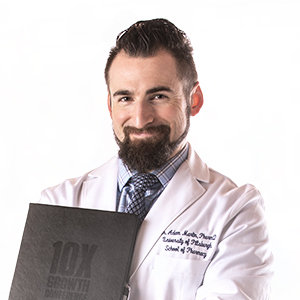2019 Winners

Notable achievements
- Speaker at pharmacy schools, Phi Lambda Sigma, SNPhA, and national conferences
- Author of Gen-Z Pharmacist: The Pharmacy Student Manual to Script Your Career, Life, and Legacy in The New Age of Pharmacy and Rx: YOU! The Pharmacist’s Survival Guide for Managing Stress & Fitting in Fitness
- Host of The Fit Pharmacist Healthcare podcast
- Contributing author for Pharmacy Times
- Inaugural member of the Pennsylvania Pharmacists Association’s Leadership Excellence and Advocacy Development (LEAD) program
- Medical missionary in Honduras and Panama
How long have you been a pharmacist?
I got my pharmacy degree at the University of Pittsburgh School of Pharmacy in 2012. I have been working full-time as a community pharmacist for CVS, since I graduated. I am also the founder of The Fit Pharmacist, a company dedicated to empowering pharmacy students and pharmacists to dispense their full potential through my speaking programs, coaching, and social media content. I specialize in leading pharmacy professionals to put their health back into health care, and I provide Simple Solutions that are practical for the busy pharmacist life with the best-selling book Rx: YOU! The Pharmacist’s Survival Guide for Managing Stress & Fitting in Fitness.
Why did you become a pharmacist?
I am blessed to have a loving family: the guidance from my father, Peter, my fearless sister, Chelsea, and the unconditional love from my mother, Marcia, who fought a 5-year battle against cancer.
My mother was my inspiration. When she was diagnosed with cancer, we were in the pharmacy most days of the week. I was in high school and looking for a career.
We don’t have any pharmacists in our family. We don’t have any neighbors who are pharmacists. I didn’t know any pharmacists personally. But, each day I saw total strangers treating us like family.
They were always asking, “How’s your mom doing? Is there anything we can do for her?” They were going above and beyond, and it caught my attention. I wanted to be that guy, that person, who can help when someone is facing a health crisis or is devoid of hope. I want to be that guiding light that can let them know someone cares and can direct them toward the best resources for their situation. That’s where the spark originally came from.
What does a day in the life of a pharmacist look like?
I live about 45 minutes from where I work. My schedule varies from 13-hour shifts to split shifts, averaging 42 hours per week. A standard day is everything and everything all the time, all at once. Organized chaos would be the simplest way to describe it.
Pharmacists have a lot of roles. We act as counselors, we fill prescriptions—it’s an eclectic mix of psychology, business, and pharmacy. A lot of different skills are needed to do the job well and to advocate for our patients’ health.
We do more than just count pills. A lot of people confuse pharmacists with big pharma. We have the patient’s best interest at heart, not the drug company, not our own agenda. Our role is to serve and guide people for what’s best for them. We take cost, side effects, preferences, and his or her finances into account to customize the best care for that individual.
Health care can be confusing and overwhelming to people without any medical training. Our role is to translate all the information, and guide patients to a place of understanding in collaboration with their other healthcare providers.
What’s the most rewarding part of your job?
Seeing someone’s life affected in a positive way is the best part of being a pharmacist. Whether it’s making a call to a prescriber about a drug interaction, or saving someone money on a better alternative medication—I love being able to make an intervention that wouldn’t have happened without the pharmacist.
I try to go into every single day, shift, and interaction remembering that I can have an impact on every single patient. It’s not, “Oh, I’m too busy. I can’t do this.” It’s, “I have an opportunity to really impact someone’s life—right here, right now.” The only person who can decide whether that’s going to happen is me. I take the trust that patients put in me very seriously.
A person is coming to me, a stranger, with sensitive personal health conditions. I try to connect, and show that I really care about that person as an individual. I learn my patients’ names, and remember to ask about their family reunions, or their children’s birthdays. I genuinely want to know what’s going on in their lives. It’s not a blanket interaction, it’s different for every person. Some people respond to jokes. Others love handwritten cards. We have a policy in my pharmacy that whenever someone loses a loved one, we write a card and all sign it. That really touches people. Once that bond of rapport and trust is established, I can really make a big impact, and that’s really fulfilling.
What is your favorite moment as a pharmacist?
A few years ago, a man came in and told me that his wife was recently diagnosed with cancer, and they would be filling a lot of prescriptions. She came in the next day to pick them up. She was the sweetest lady. You would never have known her diagnosis. I really wanted to show her I cared and give her a little something extra.
There were smiley face stickers in multiple colors laying on the counter. When I was ringing her out, I asked, “What’s your favorite color?” When she told me it was blue, I stuck a blue smiley face on her prescription bag before I handed it to her. She lit up when she saw it. It made her day.
It was the simplest thing. I wanted to replicate it. I went on Amazon, and bought thousands of smiley face stickers. Now, whenever I see a patient having a down day, or if they are new and I’m trying to get to know them, I give them a smiley face in their favorite color. When I dispense prescriptions, I also try to dispense hope. Making someone feel special is really what I’m here to do as a pharmacist.
What do you think customers should know to save money on prescriptions?
As their pharmacists, we have their best interests at heart. A lot of people see a really high price and think they just have to accept it. But most pharmacists are really accessible. You can pick up the phone or walk into the pharmacy and talk to them. Just say, “Hey, I’m struggling with this price. Do you have any suggestions?”
We can look up alternatives, help patients with drug manufacturer cards, or refer them to state-funded programs. If someone is in the Medicare donut hole, a medication isn’t covered, or they have a really high insurance copay, a pharmacy savings card can be beneficial. Patients find value in that. There are a lot of resources, and we can help them find the best option for the situation.
What advice would you give someone who is thinking about becoming a pharmacist?
You have to invest in your self-care. People’s lives are in your hands, and it’s easy to get burned out or overly stressed. Pharmacists regularly put aside working out and proper nutrition because they think it’s selfish. But, just like high blood pressure, unmanaged stress creeps up on you. You can’t pour from an empty cup. If you’re not functioning at 100%, your patients will suffer from that.
My passion is helping pharmacists and pharmacy students create practical ways to do that. When pharmacists take care of themselves, they can lead their patients by example. They will see that you’re practicing what you’re preaching.
It’s why I wrote my book and why I run my podcast, The Fit Pharmacist Healthcare podcast—to help pharmacists and their work environment.
Notable achievements
- Speaker at pharmacy schools, Phi Lambda Sigma, SNPhA, and national conferences
- Author of Gen-Z Pharmacist: The Pharmacy Student Manual to Script Your Career, Life, and Legacy in The New Age of Pharmacy and Rx: YOU! The Pharmacist’s Survival Guide for Managing Stress & Fitting in Fitness
- Host of The Fit Pharmacist Healthcare podcast
- Contributing author for Pharmacy Times
- Inaugural member of the Pennsylvania Pharmacists Association’s Leadership Excellence and Advocacy Development (LEAD) program
- Medical missionary in Honduras and Panama

